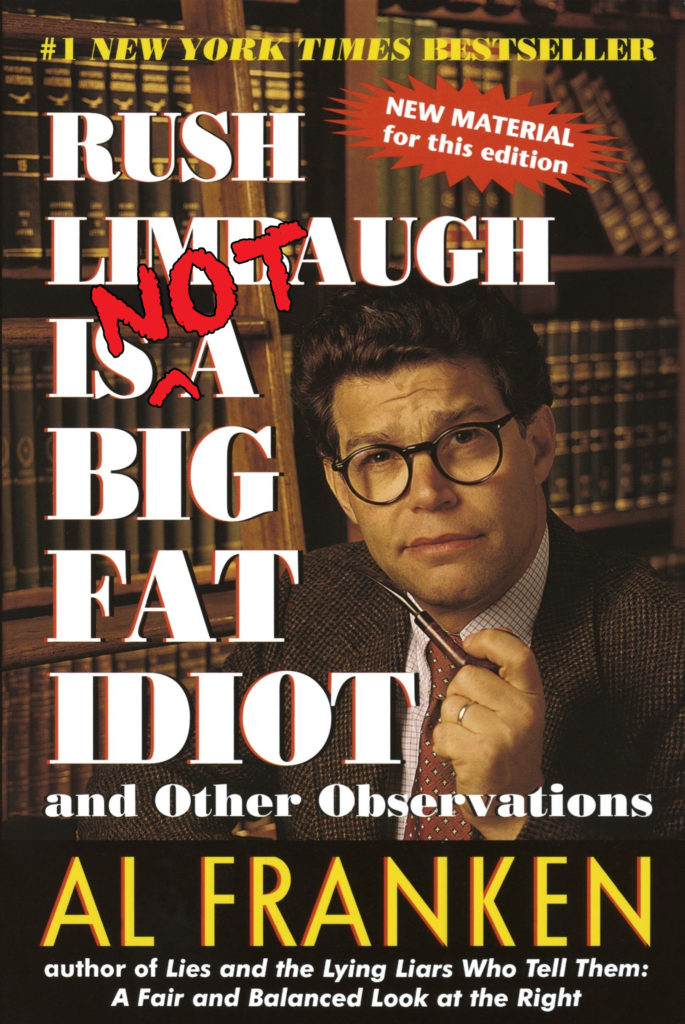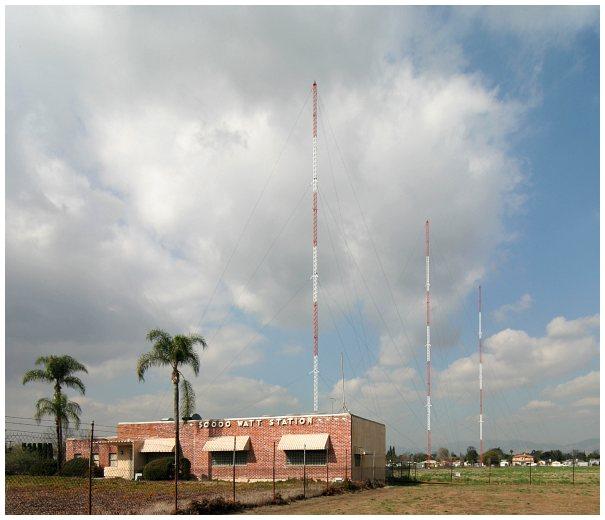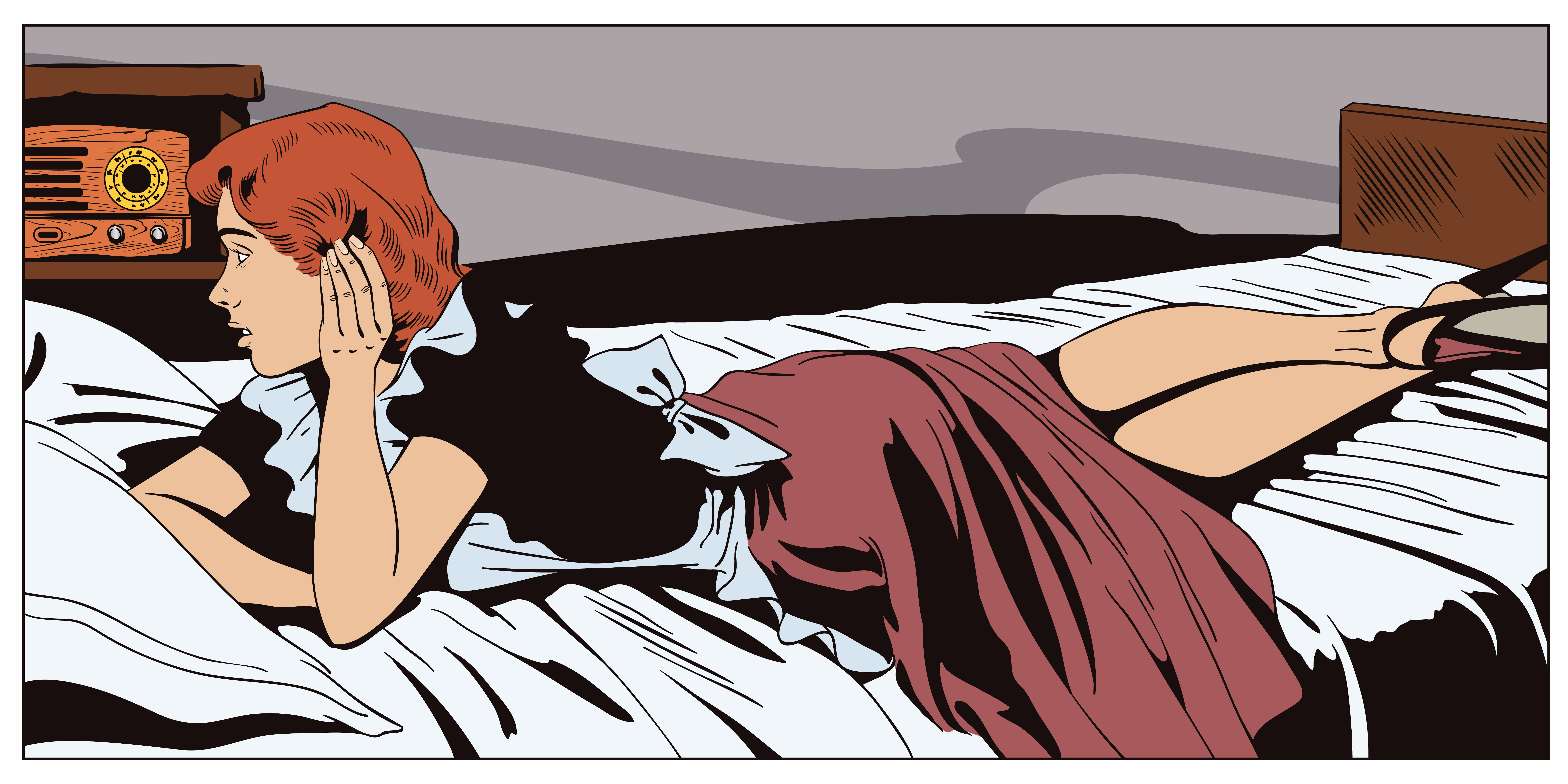
Despite their diametrically opposed political views, Rush Limbaugh and Al Franken have something in common. Years before he ran for that Senate seat in Minnesota, Franken was a comedian, a film star, and even an author. He was one of the original writers at “Saturday Night Live” in the 70s when that show first aired.
Two decades later, his writing career took a sharp turn toward the political. “Lies and the Lying Liars Who Tell Them” was one of these books. Another – “Fair and Balanced” – used former Fox News talk host Bill O’Reilly’s photo on its cover. Fox News sued, claiming copyright infringement because of the book’s title. Franken won the suit, and his political career took off.
But the Al Franken book I remember was first published in 1996. “Rush Limbaugh is a Big Fat Idiot (and Other Observations”) excoriated conservative talk shows hosts on both TV and radio.
As it turned out, Franken was elected to the U.S. Senate in 2008, but stepped down in 2017 after intense pressure from both parties over a sexual scandal.
And in the meantime, Limbaugh’s career continues on the radio at scores of radio stations across the U.S. In 2017, Talkers estimate Limbaugh commanded an audience of more than 15 million listeners.
So, a big, fat idiot? Hardly.
Rush is one amazing radio guy. One of the reasons he’s still at the top of his game is that he’s simply sharper, smarter, and more talented than most of his contemporaries. He’s always been an entertainer first, and then a talk show host and political animal.
Rush’s response to a caller on Tuesday was a rare window into his radio soul. Radio Ink printed several of Limbaugh’s response to a guy named Matteo who called in asking why Rush isn’t more active on YouTube and other digital media channels. I navigated over to www.rushlimbaugh.com where they conveniently printed out Rush’s diatribe.

Rush relished the question – it was right in his wheelhouse. He proceeded to reel off his self-styled radio philosophy (and I’m reordering this a bit for the purposes of this post). When it comes to radio, this is what makes him tick:
I’m in radio.
Radio is my business.
Radio’s what I’m best at.
Radio, I own it. I love it. Radio is where I am best able to do what I do. I’ve got a Dittocam here. I don’t need YouTube. I’ve got RushLimbaugh.com. Why should I help some other business enterprise? Why get caught up in the clogged arteries of YouTube when anybody can come to RushLimbaugh.com and watch me say things in my natural element? If I were gonna do YouTube videos, I would just take ’em from the Dittocam and cut ’em up and put ’em out there on the YouTube channel, and then what am I doing?
I’m urging people to leave my website and go to somebody else’s! It makes no business sense. But you say, “Wait a minute. You gotta reach people that you’re not reaching. You gotta persuade people.” No. The objective always has been to get ’em to come here. So now and then, guess what? We do end up on YouTube now and then, and we do end up on Twitter now and then. But I never make a big deal out of it, because they’re not the primary means or the primary vehicle for me. I could, if I wanted to — and this is not ego speaking.
That makes sense. Like a lot of people in the radio business, the “mother ship” has always been the terrestrial airwaves – the ether. It begins and ends there – the mic, the transmitter, the tower, the receiver. I talk. You listen.
For Limbaugh and so many others who made their names in radio (and TV) in the 70s and 80s, that’s the whole story. I hear the same type of philosophizing each year at the Radio Show and at other industry gatherings. Sure, people can listen to us on a stream, on their phones, and on Alexa. But we really don’t want them to. We make our money on the airwaves.
But has anyone at Premiere introduced Rush to Gordon Borrell or Erica Farber. They’d tell him that when it comes to traditional spot revenue, radio’s been flattish to down for some time now, while the digital flow has turned sharply positive. Does he know that AM radio – the home for Rush Limbaugh on so many stations across America – has atrophied, diminished, and is now even being left out of dashboards in some electric cars? He may still bring it every day, but like a nice store in a mall that’s in a sketchy neighborhood, fewer and fewer people – of all ages – are spending time there.
One of the best moments in Limbaugh’s soliloquy was his thoughts about intimacy, and radio’s remarkable ability to connect with people in a way that’s unique to other media.
I really do believe, Matteo — and you have just inadvertently, unknowingly proved it — that radio done right and done well offers the greatest intimacy in media. And I don’t… I’m not talking about sexual intimacy.
I’m talking about relatability, bond of connection: People understanding, getting to know each other, and having no doubt about what they’re hearing. It’s just the best if it’s done right, and it’s because you’re not watching anything at the same time that’s distracting you. A good radio guy or girl/woman paints the pictures that you see, or you do it yourself. But the intimacy that radio can cause to happen also enhances persuadability out the wazoo, because it’s in that intimacy that you develop the trust and the believability, hopefully, that the audience invests in you.
Brilliant. And in the case of Rush and so many who have followed in his footsteps, it’s been that radio foundation – that unique connection to fans – that has allowed them to build their empires, especially in syndication. Limbaugh may be in hundreds of markets across the U.S., but “Dittoheads” feel like he talking directly to them. Over the years, he has demonstrated that unique ability to engage, connect, and inspire.
But then there’s the little matter of where the revenue – and the audience – is heading. Radio has no shortage of challenges – topics that we regularly discuss here. For the medium to survive and thrive, it must effectively deal with advertiser disruption, the dashboard, on-demand audio, and so many other big boulders that stand in the way of the medium continuing to be viable.
But perhaps the biggest barrier to future success is generational. Millennials are just the beginning. Radio has managed to stay out of existential danger over the decades due in no small part to habit. And that’s a good thing. Millions wake up every morning and start their day with a favorite morning show. They jump in the car to head to work, and the radio goes on to accompany them on their (hopefully, long) commute, and they flip on a radio at work (or are exposed to someone else’s) – because they always have.

But for that next generation of Z’s (or as they called them last week in British Columbia, Zeds), habit has been about YouTube, Instagram, Twitch, podcasts, Spotify – all brands and platforms that radio can participate in, but it requires personalities, syndicators, owners and operators to recognize shifting media usage patterns – and be there.
Rush Limbaugh could be – should be – in all these places. Perhaps his politics are not in-sync with the belief of most Millennials, but that’s how his “Excellence In Broadcasting” network started – winning people over on the medium of their choice. Back in the early 90s, it was broadcast radio. And while it has served him very well over the years, he knows it’s changing. The question is, what will he do about it?
Here’s Limbaugh’s “take” on changing audiences and how to continue to appeal to them:
So I know Millennials do YouTube. I know Millennials are cutting the cord, doing more streaming, doing this or that. But I also have a business responsibility for every radio station I’m on to be as highly rated as possible. And if you can find me a whole bunch of other places, then there’s no need to come to the radio (or not as much) every day. So I don’t want anybody… It’s not ’cause I’m lazy. It’s not ’cause I don’t take it seriously. It’s not ’cause I’m not doing everything I can.
It’s just, this is what I do. This is what I excel at, this is what I love, and this is where I am best.
I know there’s some of you who disagree. “Come on, Rush. You own radio. You can branch out. You’re not gonna hurt yourself. People are still gonna find you on radio.” Maybe. Maybe so. But there’s also a little defiance. I’m not gonna cave in. I’m not gonna sit here and say, “I can’t succeed without being on YouTube,” or TV or what have you.
I’m also happy, folks. My ambitions have been met and then some, and my ambitions are still there, and they’re still big and huge. But they’re all self-contained in this universe.
Rush speaks for a lot of people in radio at this stage of their careers. He’s done it. Truly, one of the most successful broadcasters of all time Our AQ2 survey earlier this year affirmed Limbaugh’s talents and influence, especially among his peers in talk radio. Second only to Howard Stern, Limbaugh’s impact – not just on radio, but on the political discourse of our times – has been immeasurable.
In his monologue to Matteo, Rush sounds like someone who has accomplished his goals – and then some. It’s hard to think of a radio personality who’s enjoyed more success and impact than him. But as Rush also affirms, it started on the radio and that where it will undoubtedly end.
That’s great if you’re Rush Limbaugh. But if you’re in the greater community of those who ply their craft behind a microphone, there’s work to be done, there are new listeners to meet, there are legions of fans to bring into the flock.
Whether you’re Ben Shapiro, the Mens Room, or you’re just starting out on the radio, an intrinsic commitment to being wherever the audience is what future radio dreams will be made of. A digital strategy isn’t just a good idea – it’s table stakes at the media casino where the ante is higher and the odds have worsened.
Limbaugh has lived the American Dream – thanks to his talent and the media empires that supported him. He’s made untold millions for himself and for the broadcasters who have carried his show.
But talent, operators, and strategists who are inspired by Rush’s vision of radio – its past, present, and future – should do what any American has the God-given right to do.
Change stations.
Note: Thanks to Lori Lewis, who put this Rush show in front of me and posed some of the questions you read in this post. -FJ
- What To Do If Your Radio Station Goes Through A Midlife Crisis - April 25, 2025
- A 2020 Lesson?It Could All Be Gone In A Flash - April 24, 2025
- How AI Can Give Radio Personalities More…PERSONALITY - April 23, 2025




What a Rush!